Seven Impossible Interviews Before Breakfast #30
(The SBBT Edition): Entering Brent Hartinger’s Brain
 June 18th, 2007 by jules
June 18th, 2007 by jules
{Note: For a listing of the other interviews in the Summer Blog Blast Tour featured at other blogs today, scroll down to the very bottom of this post}.
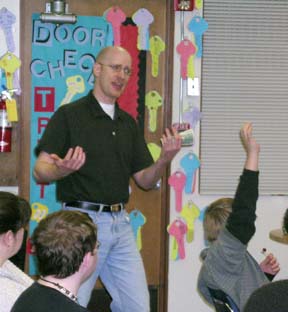 Visit YA author Brent Hartinger’s web site, and you’ll read in large print: “I am Brent Hartinger, and I live to write.” And in having the opportunity to chat with him here at 7-Imp for this week’s Summer Blog Blast Tour, it’s evident to us that this passion for writing pervades all he does. (He’s also really fun and, as YA & Kids Book Central put it in a 2005 interview, “a heck of an interesting guy”). As Rosemary Ponnekanti wrote in this recent article in Tacoma, Washington’s News Tribune, “Plays. Screenplays. Gay teen novels, straight teen novels. Teaching, speaking, gay support groups -– Tacoma writer Brent Hartinger’s career has run quite a gamut.”
Visit YA author Brent Hartinger’s web site, and you’ll read in large print: “I am Brent Hartinger, and I live to write.” And in having the opportunity to chat with him here at 7-Imp for this week’s Summer Blog Blast Tour, it’s evident to us that this passion for writing pervades all he does. (He’s also really fun and, as YA & Kids Book Central put it in a 2005 interview, “a heck of an interesting guy”). As Rosemary Ponnekanti wrote in this recent article in Tacoma, Washington’s News Tribune, “Plays. Screenplays. Gay teen novels, straight teen novels. Teaching, speaking, gay support groups -– Tacoma writer Brent Hartinger’s career has run quite a gamut.”
And if, as a fan, you visit his site (“Brent’s Brain”), you will be rewarded with all kinds of information about Brent and his writing. Accessibility seems to be his middle name and a large part of his endearing charm. Yes, visit “Brent’s Brain” and get full access to all his lobes, frontal and otherwise. There’s his bio; a link to events; a listing of his books; his “deep dark past” and his story about discovering, as a teen, that he was gay; an entire page devoted to “being gay” (“It’s a cliché to say it, but I’ve always known I was gay”); a page which links to his blogs and MySpace presence; a press room and media coverage page; a page of FAQs about his novel (“questions that haunt me”); and even more. (To boot, there are even squishy brain sounds when you click on links in the form of brain lobes).
 And Hartinger’s brain is a good, good place. He’s been called “a master at crafting a high school setting” (Colleen Mondor in a 2005 Bookslut feature about censorship); he’s well-loved by teen and adult readers (Hartinger noting in this recent interview by his long-time partner, Michael Jensen, at AfterElton.com that people write fan fiction about — as well as screenplay adaptations of — his books); and, as written in the Seattle Post-Intelligencer in a 2003 interview by Cecilia Goodnow, he’s an author with “a funny streak and a square-peg outlook. And he always roots for the underdog, having been one himself.”
And Hartinger’s brain is a good, good place. He’s been called “a master at crafting a high school setting” (Colleen Mondor in a 2005 Bookslut feature about censorship); he’s well-loved by teen and adult readers (Hartinger noting in this recent interview by his long-time partner, Michael Jensen, at AfterElton.com that people write fan fiction about — as well as screenplay adaptations of — his books); and, as written in the Seattle Post-Intelligencer in a 2003 interview by Cecilia Goodnow, he’s an author with “a funny streak and a square-peg outlook. And he always roots for the underdog, having been one himself.”
If you’re a big Hartinger fan already and know all about his books and his commanding, dynamic ability to connect with readers, why then, scroll on down to the interview (below the seven, centered asterisks) and have fun getting to know him a bit better. If you need a Brent Hartinger 101 — his books, his blogs, his activism — we’re pleased to provide one. Here goes:
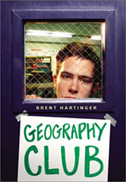 Hartinger’s first novel, Geography Club, was published in 2003 by Harper Tempest, bringing us the story of Russel Middlebrook, a student at Robert L. Goodkind High School, who is convinced he’s the only gay student there. Much to his surprise, he eventually discovers there are other gay and bisexual students, including Kevin, the popular but closeted star of the school’s baseball team. As a way to get together without drawing attention to themselves, they “choose a club that’s so boring nobody in their right mind would ever in a million years join it”: The Geography Club . . . “The book is pretty autobiographical,” Hartinger has said. “I wouldn’t have called myself gay at 16, but in all other respects it’s pretty similar. I was like Russel in that I was a watcher. I think a lot of gay kids are, because you’re constantly thinking, ‘Is this for me? Will this kid drag me down and increase scrutiny on my life?'” The book was met with a lot of acclaim — from both reviewers and teens. School Library Journal wrote, it is “{a} compelling look at the high school scene and the serious consequences of being ‘different.’ The plot never falters . . . This author has something to say here, and his message is potent and effective in its delivery. Many teens, both gay and straight, should find this novel intriguing.” And The Horn Book wrote, “this is the most artful and authentic depiction of a gay teen since M.E. Kerr’s groundbreaking Charlie Gilhooly in {1978’s} I’ll Love You When You’re More Like Me.” Stage adaptations of Geography Club have been produced, and there is currently a feature film adapation of the novel in the works (which Hartinger discusses a bit below).
Hartinger’s first novel, Geography Club, was published in 2003 by Harper Tempest, bringing us the story of Russel Middlebrook, a student at Robert L. Goodkind High School, who is convinced he’s the only gay student there. Much to his surprise, he eventually discovers there are other gay and bisexual students, including Kevin, the popular but closeted star of the school’s baseball team. As a way to get together without drawing attention to themselves, they “choose a club that’s so boring nobody in their right mind would ever in a million years join it”: The Geography Club . . . “The book is pretty autobiographical,” Hartinger has said. “I wouldn’t have called myself gay at 16, but in all other respects it’s pretty similar. I was like Russel in that I was a watcher. I think a lot of gay kids are, because you’re constantly thinking, ‘Is this for me? Will this kid drag me down and increase scrutiny on my life?'” The book was met with a lot of acclaim — from both reviewers and teens. School Library Journal wrote, it is “{a} compelling look at the high school scene and the serious consequences of being ‘different.’ The plot never falters . . . This author has something to say here, and his message is potent and effective in its delivery. Many teens, both gay and straight, should find this novel intriguing.” And The Horn Book wrote, “this is the most artful and authentic depiction of a gay teen since M.E. Kerr’s groundbreaking Charlie Gilhooly in {1978’s} I’ll Love You When You’re More Like Me.” Stage adaptations of Geography Club have been produced, and there is currently a feature film adapation of the novel in the works (which Hartinger discusses a bit below).
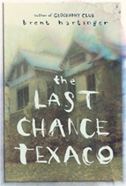
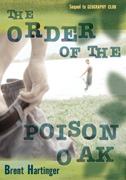
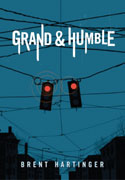 Geography Club was followed by 2004’s Last Chance Texaco (Harper Tempest), in which troubled teen Lucy Pitt struggles to fit in as a new tenant at a last-chance foster home (the novel was named a 2005 ALA Quick Pick for Reluctant Readers); The Order of the Poison Oak (2005, Harper Tempest), a sequel to Geography Club, in which Russel decides to take a counselor job at a camp for burn victims to get away from the antagonism of his classmates, but finds ten-year-old boys have just as many problems as he does (described by Kirkus Reviews as “a perfect teen patois” and “a touching and realistic portrait of gay teens”); and the “taut, skillfully woven psychological thriller” — in the words of The Bulletin for the Center for Children’s Books — Grand & Humble (2006, Harper Tempest). See Eisha’s twenty-word review of it here at 7-Imp.
Geography Club was followed by 2004’s Last Chance Texaco (Harper Tempest), in which troubled teen Lucy Pitt struggles to fit in as a new tenant at a last-chance foster home (the novel was named a 2005 ALA Quick Pick for Reluctant Readers); The Order of the Poison Oak (2005, Harper Tempest), a sequel to Geography Club, in which Russel decides to take a counselor job at a camp for burn victims to get away from the antagonism of his classmates, but finds ten-year-old boys have just as many problems as he does (described by Kirkus Reviews as “a perfect teen patois” and “a touching and realistic portrait of gay teens”); and the “taut, skillfully woven psychological thriller” — in the words of The Bulletin for the Center for Children’s Books — Grand & Humble (2006, Harper Tempest). See Eisha’s twenty-word review of it here at 7-Imp.
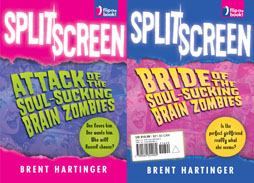 This year, Hartinger brought us Split Screen: Attack of the Soul-Sucking Brain Zombies/Bride of the Soul-Sucking Brain Zombies (Harper Tempest), a companion novel to Geography Club and “a horror-movie extravaganza . . . two books in one recount the stories of best friends Min and Russel who sign up to be extras on the set of a zombie film — then learn that there’s nothing scarier than high school romance,” as described at Hartinger’s site. ALAN wrote in their review, “Hartinger has another winner in this well-written and often poignant story.” Pop Candy wrote about Hartinger at the release of this novel, “I really think this guy could be the next Judy Blume.”
This year, Hartinger brought us Split Screen: Attack of the Soul-Sucking Brain Zombies/Bride of the Soul-Sucking Brain Zombies (Harper Tempest), a companion novel to Geography Club and “a horror-movie extravaganza . . . two books in one recount the stories of best friends Min and Russel who sign up to be extras on the set of a zombie film — then learn that there’s nothing scarier than high school romance,” as described at Hartinger’s site. ALAN wrote in their review, “Hartinger has another winner in this well-written and often poignant story.” Pop Candy wrote about Hartinger at the release of this novel, “I really think this guy could be the next Judy Blume.”
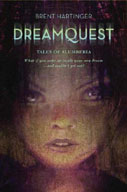 Hartinger’s most recent novel takes his readers in an all new direction. It’s entitled Dreamquest (May 2007, Starscape) and tells the story of eleven-year-old Julie, whose parents constantly fight and who has nightmares every evening. One night, she wakes to find herself inside the studio where her dreams are produced, and she must find the person responsible before she is trapped inside her dreams forever. Publishers Weekly wrote of the novel, “Hartinger deftly moves into the realm of fantasy in his latest outing . . . {his} winning pairing of a sincere message with hyperbolic humor should resonate with readers.” An excerpt, Chapter One, can be read here at the Starscape site. Dreamquest is the first in a new Hartinger series, Tales of Slumberia, and he discusses this a bit more below as well.
Hartinger’s most recent novel takes his readers in an all new direction. It’s entitled Dreamquest (May 2007, Starscape) and tells the story of eleven-year-old Julie, whose parents constantly fight and who has nightmares every evening. One night, she wakes to find herself inside the studio where her dreams are produced, and she must find the person responsible before she is trapped inside her dreams forever. Publishers Weekly wrote of the novel, “Hartinger deftly moves into the realm of fantasy in his latest outing . . . {his} winning pairing of a sincere message with hyperbolic humor should resonate with readers.” An excerpt, Chapter One, can be read here at the Starscape site. Dreamquest is the first in a new Hartinger series, Tales of Slumberia, and he discusses this a bit more below as well.
 And, as mentioned above, Hartinger has a very active, involved online presence — from his MySpace corner of cyberspace to his own blog, Voices in My Head. But he also co-founded an anti-censorship organization, Authors Supporting Intellectual Freedom (AS IF!), which has its own LiveJournal, blog, and MySpace home. AS IF! “champions those who stand against censorship, especially of books for and about teens,” as their mission statement notes. The story of how AS IF! began, involving a private school who “gave up three million dollars rather than compromise the principles of academic independence and intellectual freedom” (in Hartinger’s words), is here. At the AS IF! blog, there’s a long list of all the authors who have joined the cause, and the blog and LiveJournal serve as news sources (and provide author interviews) on the latest bans and most recent attempts at censorship.
And, as mentioned above, Hartinger has a very active, involved online presence — from his MySpace corner of cyberspace to his own blog, Voices in My Head. But he also co-founded an anti-censorship organization, Authors Supporting Intellectual Freedom (AS IF!), which has its own LiveJournal, blog, and MySpace home. AS IF! “champions those who stand against censorship, especially of books for and about teens,” as their mission statement notes. The story of how AS IF! began, involving a private school who “gave up three million dollars rather than compromise the principles of academic independence and intellectual freedom” (in Hartinger’s words), is here. At the AS IF! blog, there’s a long list of all the authors who have joined the cause, and the blog and LiveJournal serve as news sources (and provide author interviews) on the latest bans and most recent attempts at censorship.
Hartinger is passionate about school visits and travels the country on speaking engagements. He teaches MFA creative writing at Vermont College. He also recently taught creative writing at the Tacoma School of the Arts in Tacoma, Washington, where he lives with his long-time partner, Jensen (Hartinger was dubbed Mr. Nirvana by the Tacoma students, according to the aforementioned News Tribune article, one of them saying, “{h}e is an amazing storyteller . . . a master of plot and getting the point across, and he’s a wonderful teacher . . . I’d sell my soul to take another class from him.” Do you think maybe they liked him?).
Whew. Hartinger’s a busy, multi-faceted, passionate guy, but what do you say we get to the interview? We thank him kindly for stopping by. Without further ado, here’s Brent . . .
 7-Imp: Can you tell us all about Dreamquest, your first fantasy novel? Can you tell us about Tales of Slumberia in general and Brainstorm (slotted for a May ’08 publication, correct?)? And can you comment on the next two Russel Middlebrook books, which will be told from Kevin’s and Min’s points-of-view? (Also, any plays in the works?) . . .
7-Imp: Can you tell us all about Dreamquest, your first fantasy novel? Can you tell us about Tales of Slumberia in general and Brainstorm (slotted for a May ’08 publication, correct?)? And can you comment on the next two Russel Middlebrook books, which will be told from Kevin’s and Min’s points-of-view? (Also, any plays in the works?) . . .
Brent: I hate it when people recite back to me my publication schedule, because I always look at all those projects and think, “What, am I nuts?” Which I guess I am. But strike while the iron is hot and all that.
Dreamquest, which is, like, just out, is a fantasy for kids. It’s the story of Julie, a girl plagued by terrible nightmares who wakes up one night in “Slumberia,” the magical place inside her own brain where they film her nightly dreams. In order to stop the nightmares for good, Julie must battle first the dreamwriter, then the dream-producer, and then even the evil dream-executives in far-away Nightmare City. But she has to work fast, because the bratty look-alike actress who “plays” her in the dreams slipped over into the “real” world, and is on the verge of taking over her life forever.
It’s hopefully funny, it’s hopefully a little scary, it hopefully has heart, and there just might be some satire in there about my time in Hollywood working as a screenwriter.
It’s a series, Tales of Slumberia, so I’m working on a sequel, Brainstorm, probably for 2009. I’m also working on another sequel in the Geography Club series which, yes, will be from Kevin’s POV. I’ve only just started it (for fall 2008), but I know it will be a mystery, and that it will (hopefully!) finally resolve the whole Kevin-Russel storyline. The Min book? That’s still only a glint in my eye, but I hope I get a chance to write it. That’s up to my publishers.
Productions of the play version of Geography Club are popping up here and there, and there’s a New York production in the works, but that’s still a long way off.
And last but not least, I just finished a book about a couple of teenagers who discover they can do astral projection. It’s called Shadowwalkers. That’ll be out next year.
Whew! Just typing all this makes me tired.
 7-Imp: Can you tell us more about your blogs, particularly the blog for AS IF!? What specifically motivated you to co-found that? What do you think is the best thing it has accomplished so far? And what’s the most ludicrous/egregious instance of censorship you’ve encountered as an author?
7-Imp: Can you tell us more about your blogs, particularly the blog for AS IF!? What specifically motivated you to co-found that? What do you think is the best thing it has accomplished so far? And what’s the most ludicrous/egregious instance of censorship you’ve encountered as an author?
Brent: Well, it was funny, because a group of writer friends and I were always bemoaning all these book challenges. And then a couple of us, I think it was Jordan Sonnenblick and Mark Williams, said, “Well, hey, why don’t we, like, start an anti-censorship group?” I came up with the name, Authors Supporting Intellectual Freedom (or AS IF!), and we’ve been doing our little activism thing ever since. Our latest two members are M.T. Anderson and Meg Cabot.
What we do is hard to explain, because it differs. Basically, we work behind-the-scenes, doing whatever those on the front line want us to do. Sometimes that means writing letters or emails and spreading the word, sometimes that means offering tactical support and advice. After so many challenges, we’re getting pretty good at knowing what kinds of talk wins these debates. Because it’s really about winning hearts and minds, getting people to see the big issues involved—not just getting a particular book back on the shelves.
But mostly I think we’re just trying to educate the general public on how a tiny minority of folks wants to radically rewrite the definition of a “library.” What books should a library have? Well, the right question to ask, of course, is not, Will anyone in my community be offended by this book? Instead, it’s, Will anyone in my community be served by the presence of this book?
Many of our members, myself included, give speeches, write columns, and just generally make noise on this topic.
Interestingly, about a week after we founded AS IF! in 2005, my book, Geography Club, was officially banned for the first time. So I was literally our first object of support. But by being in the hotseat, then and many times since, I think I have a pretty good perspective. I’ve learned soooooo much about challenges and censorship and “age appropriateness” and all the rest. Which of course completely haunts me now when I’m writing a new book!
The most ludicrous challenges I’ve seen? So many of them seem like lunacy to me.
7-Imp: Can you talk a bit about your own experiences with political activism, particularly with GLBTQ youth? Also, since you are writing for a group that, as a whole, struggles so much (gay teens), do you feel there is there more pressure on you to “get it right” with your books? In other words, do you worry more about how your audience will receive your work, since it potentially matters so much to them?
Brent: Oh, yeah, I feel an enormous responsibility. Which is probably stupid because, let’s face it, they are just books. But yeah, I hear from so many people how important these books are.
Honestly, though, the most important thing, for me is still, is it a good story? Is it entertaining? Because that’s what I’m doing: writing what I hope are entertaining stories. It’s not political activism. When a writer gets preachy or, frankly, starts to take himself too seriously, thinking that his books are changing the world or whatever, well, that’s when I think the books start to get really baaaaaad.
That said, my friend David Levithan says, “There is nothing like a book whose time has come.” And it is really, really true of gay-themed books these days. For ten years, I tried to get Geography Club published, and no one—and I mean no one—was interested. But then it was like someone flipped a switch, and the floodgates were opened.
And the reason why, of course, is that society was finally ready. We’ve reached one of those exciting turning points in society, and as always, it’s the young people who are leading the way. So many adults are still so terrified of the gay issue, so frightened of controversy. But go to almost any high school in the country, at least outside some areas of the South, and where is the energy? It’s the gay issue. What cause are all the thoughtful, intelligent kids devoting themselves to? The gay issue. And I’m not just talking about the gay kids; it’s straight kids, too.
Teenagers are so far ahead of adults on this issue that it’s funny. But like I said, that’s always the way it is.
7-Imp: You mention at your website that one of your presentation topics (to schools) is along the lines of why every novelist should be a playwright. Could you expand on that a bit (without giving away your entire presentation, which, of course, you get paid for doing!)? We know you’re a big believer in structuring/outlining a book before writing; is that part of what you mean?
Brent: It took me many, many years before I was able to make a living writing my fiction, and in those years, I turned to other mediums: screenwriting and playwriting. At the time, I was just desperately trying anything to break through. But the weird thing was, it totally made me a better writer in all mediums. It’s like that line in “Tootsie,” “I was a better man as a woman than I ever was as a man.” I was a better novelist as a screenwriter than I ever was as a novelist.
People talk like the mediums are just soooo radically different. And sure, there are differences. But a story is a story is a story. I think many, many writers of novels would do well to learn that plot isn’t anything to be afraid of, that a book is more than just pretty, poetic language. That something needs to happen, and that, yes, readers do want a sense of resolution, a feeling that there was a point to the book. Why did we go through all that? As a playwright, I literally was in the room as people were reacting to my work, and I saw exactly where the audience responded, and where they didn’t. And the things they respond to are desire, strong motivation, conflict, action, and resolution.
The audience isn’t always right, but they’re almost always right. We ignore them at our peril.
So that’s what I talk about, spelling out exactly what “dramatic structure” is, which, incidentally, is completely different from “formula.”
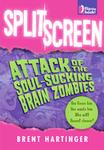 7-Imp: Speaking of . . . You talk in this interview at Cynsations about how Split Screen has three complete dramatic structures -– “one each for the two ‘books,’ but also a separate three-act structure, a separate emotional ‘arc,’ for both books when read together.” How difficult was that to pull off?
7-Imp: Speaking of . . . You talk in this interview at Cynsations about how Split Screen has three complete dramatic structures -– “one each for the two ‘books,’ but also a separate three-act structure, a separate emotional ‘arc,’ for both books when read together.” How difficult was that to pull off?
Brent: Split Screen is the latest in the Geography Club series, the story of when Russel and Min get jobs working as extras on a horror film, and it’s two complete books in one: one from Russel’s POV (called Attack of the Soul-Sucking Brain Zombies) and one from Min’s POV (called Bride of the Soul-Sucking Brain Zombies). Read one story, then flip the book over and read the other story.
They’re two completely different stories, but they cover the same period of time. And yeah, only by reading both stories together, and by sort of reading between the lines, do you get the “whole” story, what really happened.
How difficult was that to write? You do not want to know! It was crazy-hard, and I never want to do anything like it ever again.
That said, I’m really glad I undertook the challenge, and I think it turned out okay.
7-Imp: Have you ever met anyone who has guessed the ending to Grand & Humble?
Brent: Honestly? No. No one!
I’m so proud of that ending, and that book. But it kinda came and went. It has some big fans (including some really cool, important people). But it just didn’t break out the way I’d hoped it would, mostly because it was so different from my other books, and it was hard to categorize.
But with my stage version of that book, I am absolutely determined to help the story find a bigger audience. And I promise you here and now that that book will one day be a movie. I can see it in my mind, and I am absolutely convinced that one day very soon a producer will be able to see it too.
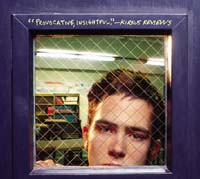 7-Imp: Do you have any plans to adapt any more of your novels to the stage (as with Geography Club and Grand & Humble)? Is the Geography Club feature film adaptation still in the works (are you allowed to talk about that yet?)?
7-Imp: Do you have any plans to adapt any more of your novels to the stage (as with Geography Club and Grand & Humble)? Is the Geography Club feature film adaptation still in the works (are you allowed to talk about that yet?)?
Brent: Now it’s more a question of what do I know, which isn’t much. The movie is definitely in the works, Kenny Ortega (of High School Musical) is attached to direct, I think they have a final script. But no, there’s no start date yet.
Interestingly, I’m currently working on another gay teen movie with some producers. It’s much lower budget, based on an old play of mine. And we plan to start shooing that one quite soon.
And yeah, I’d love to adapt more of books for the stage. But lately I seem to be writing a lot of fantasy and sci fi, which is, uh, a little hard to do on stage. I mean, how exactly do you show astral projection? Ha!
 7-Imp: You seem to go out of your way to be a very accessible writer, and your web site has a lot of wonderful information. Do you believe strongly in authors providing that accessibility to their readers? Do you feel writers owe that to their audiences?
7-Imp: You seem to go out of your way to be a very accessible writer, and your web site has a lot of wonderful information. Do you believe strongly in authors providing that accessibility to their readers? Do you feel writers owe that to their audiences?
Brent: There are two kinds of writers in the world: people who think they’re doing the world a big favor by writing, and people who think the world is doing them a big favor by reading what they’re writing. I’m definitely in the latter group. I mean, people give me the most valuable thing in the world: their time. How can that not be humbling? I’m just so grateful I get paid to do what I love.
Regarding being accessible, if you as a writer want to be a total recluse, fine. No website, no interviews. But this idea that an author has a website, but then acts all annoyed and put out or snippy when people actually email him or her . . . I don’t get it.
7-Imp: Are you enjoying teaching in the Vermont College MFA Program? What’s the most surprising thing that teaching has taught you?
Brent: It’s a fantastic program. I’m taking a year leave, but I really want to be back soon.
Next to writing plays and screenplays, teaching writing has been the second most important thing I’ve ever done to help my own writing. First, the students depend on you and take what you say seriously, so you really have to look deeply at a manuscript. And then when you turn to your own work, you can’t help but keep that perspective, and see all the amateurish mistakes you’re making in your own writing. It’s infuriating!
Plus, the job forces me to read everything in kids’ lit. And any famous, awesome kids’ lit writer I didn’t already know, I do now. That is a whole education in itself.
7-Imp: What’s one thing most people don’t know about you?
Brent: You know, I’ve published six books now, and what’s scary is that almost everything about me, every interest I’ve ever had, can be found in at least one of my books: my love for Xena: Warrior Princess and the Peanuts comic strip, my interest in role-playing games, Ouija Boards, and cheesy sci-fi movies, even my past as a competitive swimmer.
Yikes! I’m literally an open book!
7-Imp: Is there a question you wish interviewers would ask you, but they usually don’t? Feel free to ask and answer here.
Brent: I wish interviewers would ask where I keep my Pulitzer, my Newbery, my two Oscars, and my Printz Award. Alas, I have yet to win any of them.
7-Imp: Feel free to tell us about any events/conferences/organizations/etc. at which you’ll be speaking any time in the near future; we’re happy to evangelize for you!
Brent: I’m actually taking the rest of the year off (mostly). I’ve given something like 300 presentations in the last four years, and I’m pooped!
But people are definitely free to stop by my website or my blogs (available through my website), and say “hi!”
7-Imp: We like to conclude our interviews by posing to people the weird and wonderful set of questions called The Pivot Questionnaire (most well-known by its use on “The Actors Studio”), since who knew that asking someone, say, what their favorite sound or noise is could tell you so much about them. So here goes . . .
Brent: Oh, God, I’ve always wanted to do this!
7-Imp: What is your favorite word?
Brent: “Boink” still makes me smile.
7-Imp: What is your least favorite word?
Brent: It’s a phrase: “I’ll get back to you.”
7-Imp: What turns you on creatively, spiritually, or emotionally?
Brent: A really interesting, lively late-night conversation.
7-Imp: What turns you off?
Brent: Small talk. And small minds.
7-Imp: What is your favorite curse word? (optional)
Brent: I say “Good Lord” a lot, which sounds like it would sound stupid, but somehow I make it work.
7-Imp: What sound or noise do you love?
Brent: Big cat-person here, so any sound a cat makes, preferably purring.
7-Imp: What sound or noise do you hate?
Brent: Television commercials. And talk radio, Fox News, or George W. Bush. Basically, any simple-minded appeal to emotion, often negative emotion.
7-Imp: What profession other than your own would you like to attempt?
Brent: I’m loving teaching. Lately, I’d love to try stand-up comedy.
7-Imp: What profession would you not like to do?
Brent: Anything in an office, or that requires me to keep a regular schedule.
7-Imp: If Heaven exists, what would you like to hear God say when you arrive at the Pearly Gates?
Brent: “You were right, they were wrong.”
- “Yay! It’s Brent Hartinger!!”; Jackie’s Summer Blog Blast Tour interview at interactivereader; June 21, 2007
- Interview with by Debbi Michiko Florence at her web site; June 2007
- “Tacoma author releases new novel,” article and interview by Rosemary Ponnekanti at The News Tribune; May 29, 2007
- ”An Interview with Brent Hartinger” by Robin LaFevers at Shrinking Violet Promotions: Marketing for Introverts; May 3, 2007
- “Attack of the Gay Book Club,” a podcast at Feast of Fools; April 11, 2007
- “Attack of the Gay Teen Zombies: An Interview with Geography Club’s Brent Hartinger” by Michael Jensen at AfterElton.com; February 5, 2007
- “Author Update: Brent Hartinger,” an interview by Cynthia Leitich Smith at Cynsations; February 5, 2007
- Podcast with Hartinger (scroll down a bit) at LibraryLoft (from the Public Library of Charlotte & Mecklenburg County in North Carolina) at the release of Split Screen
- “Brent Hartinger on Geography Club” at HarperCollins; 2006
- ”Interview with Brent Hartinger” at TeensReadToo.com at the release of Grand & Humble
- Quickie Q & A about high school (“High School Scrapbook: YA Authors”) after the release of Grand & Humble
- “Interview With Brent Hartinger” by Ryan D. Brinkhurst at Events Quarterly; Winter Edition, December 1, 2005 — March 1, 2006
- “Super Duper Quickie Interview with Brent Hartinger” by Leila Roy at bookshelves of doom; February 28, 2006
- “SLJ Talks with Author Brent Hartinger” about AS IF!; written by Debra Lau Whelan; re-printed February 22, 2006
- “Author Interview: Brent Hartinger on the Banning of Geography Club“ by Cynthia Leitich Smith at Cynsations; November 23, 2005
- “Interview with Brent Hartinger” By Dominique McCafferty at Riverside Public Library (Riverside, California); Fall 2005
- ”Attention Censors,” article by Colleen Mondor at Bookslut about banned and challenged books with comments from Hartinger; August 2005
- ”Author Profile: Brent Hartinger,” interview at Teenreads.com;
April 12, 2005 - Interview at Young Adult (& Kids!) Books Central; March 2005
- Interview by Rebecca Brown at Rebecca’sReads.com; October 10, 2004
- Interview at Embracing the Child; April 2004
- ”Brent Hartinger makes his mark focused on plot,’” write-up and interview by Jen Graves at The News Tribune; February 15, 2004
- “Follow-up Interview with Brent Hartinger” by Debbi Michiko Florence at her web site; 2004
- Interview by Josh Aterovis at Black Sheep Productions at the release of Last Chance Texaco
- Interview by Peter Klaus at What’s Your Anti-Drug? at the release of The Last Chance Texaco (read the first chapter of the novel at this link)
- “Interview with Brent Hartinger, Author of Geography Club” by Sarah Warn at AfterEllen.com; June 2003
- ”Tacoma writer’s gay-theme teen novel offers insights to young adults,” write-up and interview by Cecelia Goodnow at The Seattle Post-Intelligencer Reporter; April 7, 2003
- “Interview with Debut YA Novelist Brent Hartinger” by Debbi Michiko Florence at her web site; 2003
- ”The Story Behind The Story: Brent Hartinger on Geography Club,” an interview by Cynthia Leitich Smith at Cynsations; 2003
Today’s SBBT schedule — Monday, June 18, 2007
- Tom & Dorothy Hoobler at Chasing Ray
- Mitali Perkins at Big A, little a
- Sara Zarr at Interactive Reader
- Justina Chen Headley at Hip Writer Mama
- Justine Larbalestier at A Chair, A Fireplace & A Tea Cozy
- Dana Reinhardt at lectitans
- Laura Ruby at Writing and Ruminating
- Jordan Sonnenblick at Bildungsroman
- Ysabeau Wilce at Finding Wonderland

What a great interview. Brent sounds very, very cool. Thanks for sharing this interview with us!
Fantastic. It never fails to impress me, the amount of background and research you guys dig up for these interviews.
Geez, what a thorough and fab interview! I immediately went over and signed up on As If. Didn’t know anyone was doing that work, and I’m so happy they are.
Onward, Brent!
Great interview! I heard Brent Hartinger speak at my local SCBWI group once. I enjoyed his recounting of being strung along by six or seven different agencies. I picked up a “Geography Club” temporary tattoo at that meeting.
Thanks, everybody.
Robin, AS IF! sounds perfect for you.
I’ve actually never read Geography Club and really wanna, especially now after having chatted with Brent.
Great interview! I saw Brent speak a couple years ago at the first-ever Teen Book Festival here in Rochester (pretty much the best event ever: http://www.teenbookfestival.org, third one’s already in the works for next year), and he was funny, funny, funny. I could totally see him doing stand-up comedy. I love his books, and AS IF! is a great blog. Brent’s been covering an intellectual freedom debacle we’ve been having in the town where I work over the last year or so (http://asifnews.blogspot.com/2007/05/gay-teen-books-good-news-and-bad-news.html). Happily, it all seems to have calmed down again….
(Alkelda, I also got a Geography Club temporary tattoo when I saw Brent speak. Sadly, it has long-since worn off.)
Geography Club is great – one of my favorite books. And the sequel, Poison Oak is perfect as well. (Still have to get to Split Screen.)
As always, you guys do an amazing job here – it blows me away……
What an extensive interview and informative lead-in! Kudos to all.
Jules and Eisha: Your interviews are tops. This one was just great.
300 presentations in four years. Sheesh!
I can’t believe how comprehensive this is! Great job, Jules!
I adore his answer to that final question!! Fantastic interview–and what a great guy! I can’t wait to read Dreamquest. It sounds like a lot of fun.
[…] another Interview to check out on Seven Impossible Things Before Breakfast. Something to know about Brent is that his […]